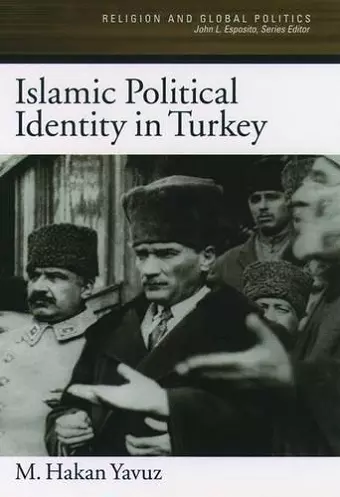Islamic Political Identity in Turkey
Format:Hardback
Publisher:Oxford University Press Inc
Published:25th Sep '03
Currently unavailable, and unfortunately no date known when it will be back
This hardback is available in another edition too:
- Paperback£42.99(9780195188233)

In November of 2002, the Justice and Development Party swept to victory in the Turkish parliamentary elections. Because of the party's Islamic roots, its electoral triumph has sparked a host of questions both in Turkey and in the West: Does the party harbor a secret Islamist agenda? Will the new government seek to overturn nearly a century of secularization stemming from Kemal Atatürk's early-twentieth-century reforms? Most fundamentally, is Islam compatible with democracy? In this penetrating work, M. Hakan Yavuz seeks to answer these questions, and to provide a comprehensive analysis of Islamic political identity in Turkey. He begins in the early twentieth century, when Kemal Atatürk led Turkey through a process of rapid secularization and crushed Islamic opposition to his authoritarian rule. Yavuz argues that, since Atatürk's death in 1938, however, Turkey has been gradually moving away from his militant secularism and experiencing "a quiet Muslim reformation." Islamic political identity is not homogeneous, says Yavuz, but can be modern and progressive as well as conservative and potentially authoritarian. While the West has traditionally seen Kemalism as an engine for reform against "reactionary" political Islam, in fact the Kemalist establishment has traditionally used the "Islamic threat" as an excuse to avoid democratization and thus hold on to power. Yavuz offers an account of the "soft coup" of 1997, in which the Kemalist military-bureaucratic establishment overthrew the democratically elected coalition government, which was led by the pro-Islamic Refah party. He argues that the soft coup plunged Turkey into a renewed legitimacy crisis which can only be resolved by the liberalization of the political system. The book ends with a discussion of the most recent election and its implications for Turkey and the Muslim world. Yavuz argues that Islamic social movements can be important agents for promoting a democratic and pluralistic society, and that the Turkish example holds long term promise for the rest of the Muslim world. Based on extensive fieldwork and interviews, this work offers a sophisticated new understanding of the role of political Islam in one of the world's most strategically important countries.
... offers some original and compelling explanations for the social and political transformation taking place in Turkey, by focusing particularly on Islamic social activism after the military coup of 1980. In this comprehensive study, Yavuz sheds new light upon Turkish Islamic groups, which are largely unknown, by mapping their social activism and by analysing their attempts to construct and enact political strategies and social activism ... Yavuz's achievement also lies in his theoretical sophistication which avoids reductionism and sensationalism. * The Muslim World Book Reviews *
... a richly documented and valuable comprehensive analysis of Islamic social movements in Turkey ... This book will become must reading for both scholars and students of contemporary Islamic democratization in Turkey and the rest of the Islamic world. * Middle East Policy *
Yavuz's study provides the best analytical and empirical study of modern Turkish politics of the last 20 years. His typology and introduction of the concept of opportunity spaces are his two major contributions to the study of the Middle East and social-movement theory. * Middle East Policy *
ISBN: 9780195160857
Dimensions: 163mm x 234mm x 28mm
Weight: 618g
351 pages